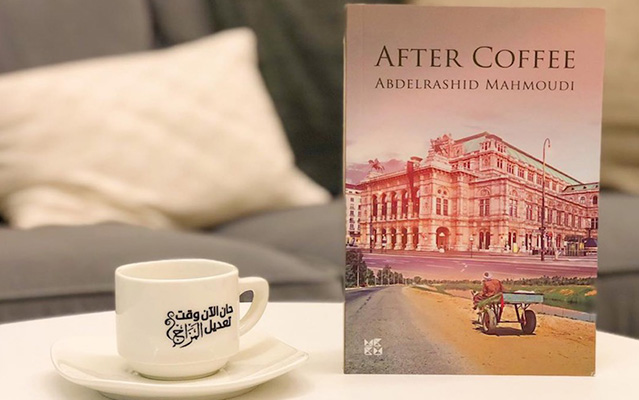Hamad Bin Khalifa University Press (HBKU Press) launched the English translation of After Coffee, the 2014 Sheikh Zayed Book Award winner by Abdelrashid Mahmoudi at an exclusive event held at the School of Oriental and African Studies (SOAS) in London.
 Dr Nora Parr, OWRI Research fellow in the School of Languages, Cultures, and Linguistics at SOAS, hosted a panel discussion with the author as well as the translator, Nashwa Gowanlock. They discussed intertextual exploration of belonging, Egyptian society, and the Arabic literary past. The focus was on the book’s unique investigation of contemporary (post-2011) Egypt that is not ‘dystopian’ or futuristic but rather looks to the past (and not the future) in order to make its commentary on the present.
Dr Nora Parr, OWRI Research fellow in the School of Languages, Cultures, and Linguistics at SOAS, hosted a panel discussion with the author as well as the translator, Nashwa Gowanlock. They discussed intertextual exploration of belonging, Egyptian society, and the Arabic literary past. The focus was on the book’s unique investigation of contemporary (post-2011) Egypt that is not ‘dystopian’ or futuristic but rather looks to the past (and not the future) in order to make its commentary on the present.
Parr said she was particularly excited to be able to provide the opportunity for students at SOAS to meet and interact with a contemporary award-winning Arab author and translator who explored the text as a totally different language.
Students learned more about the city/country dynamics of the text, and how ideas and representations of these (false) oppositions have shifted over the years, as well as the use of the trope of a traveller to Europe beyond the context of the Nahda.’
Through the efforts of HBKU Press, the critically-acclaimed book is now available to English-speaking audiences around the world.
According to HBKU Press Senior Editor Fakhri Saleh, they are committed to providing both English and Arabic-reading audiences exceptional works of literature.
The translation of this book is especially important as we are highlighting an award-winning literary work in Arabic that spreads knowledge and ideas that are coming out of the Arab world. This type of cross-cultural communication through translations, from Arabic to English is essential as it allows non-Arabic readers the chance to become immersed in the highest level of Arabic literature.’
Inspired by Mahmoudi’s personal experiences in Vienna, the book tells the story of an Egyptian man in midlife crisis set against the backdrop of the arts in the Austrian capital. The translation, however, allowed Gowanlock ‘more creativity’.
While working on the translation, Mahmoudi said his comments were given as mere proposals and he allowed Gowanlock to produce the final version. So far, the initial reactions to the translation have been favourable.
For Gowanlock, however, staying ‘true’ to the original text while explaining potentially unknown idioms, phrases, and ideas in a way that English language readers would understand was definitely a challenge.
This is a case of working to maintain the spirit and tone of the work I’m translating, focusing on transporting the meaning across, even if that requires taking so-called liberties, or using expressions or turns of phrase that are more congruent with the meaning expressed in the source text.’
Gowanlock said that she always prefer to work with the author, where possible. In this case, she said that Mahmoudi was very keen to be involved.
This was a great help since he was also a mine of knowledge of the era, and the context he had written about and within, both of which were unfamiliar to me. Being a translator in English himself, he could offer suggestions and solutions which we could discuss together.’
Both Mahmoudi and Gowanlock are optimistic about the reception of the English version of the book. Their combined efforts in presenting Arabic literature to non-Arabic readers will, in their perspective, present to the English-speaking reader a different way of viewing and thinking about, a world that is so different from their own, and yet one that is still so profoundly human.
After Coffee is available in bookstores in Qatar and online through waterstones.com, jamalon.com and Kindle. For more information about books published by HBKU Press, visit their website through this link.







